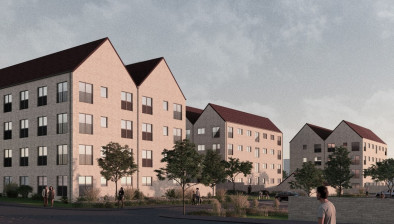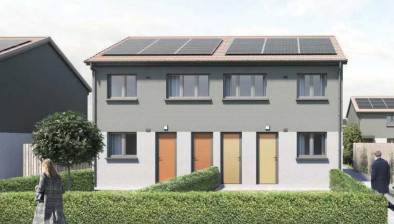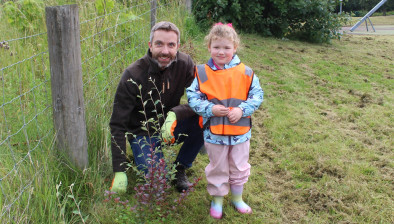Council outlines 20-year vision for Easterhouse with 6,000 new homes
 The Greater Easterhouse area of Glasgow is set to be transformed with 6,000 new homes and new nurseries and schools as part of a 20-year revamp plan.
The Greater Easterhouse area of Glasgow is set to be transformed with 6,000 new homes and new nurseries and schools as part of a 20-year revamp plan.
A Glasgow City Council report yesterday outlined how the regeneration of Easterhouse and the surrounding area will also include transport infrastructure, greenspace, improved public realm and a wetlands park featuring the redevelopment of one of Glasgow’s oldest buildings.
According to the council, the Greater Easterhouse area has attracted over £400 million of public and private sector investment over the past two decades to regenerate the area, with 3,000 new homes being constructed and the creation of the Glasgow Fort shopping centre.
The council alone has invested over £82m in supporting housing development there since 2003, with local housing bodies investing over £250m in Greater Easterhouse during the past 20 years.
Additional investment by the private sector and Glasgow Housing Association over the past decade and more illustrate the confidence in the area’s future, the council added.
The report to the council’s regeneration and economic policy and development committee detailed how future developments will continue and complete this regeneration.
With regard to housing development in Greater Easterhouse, the report details the various projects currently taking place, such as the 800 homes being built in Garthamlock, and includes other developments in Ruchazie, Barlanark, Stepford Road and many more. Ten sites in the area have been identified as potential locations on which to build private homes.
Across Greater Easterhouse are 180 hectares of vacant land, on which could be built 6,000 new homes subject to the creation of necessary infrastructure such as new roads and schools. A new nursery school is currently under construction at Mossvale Road, underlining the demand for such provision in this increasingly attractive area.
Existing homes are also being improved, with almost 250 properties benefiting from the council’s HEEPS-ABS energy efficiency scheme, reducing heating bills for local people and lowering emissions.
In addition, the Shandwick Centre in Easterhouse town centre will be redeveloped as a long-term commercial asset for the city to reflect both its changing and continuing role in the community and the success of the nearby Glasgow Fort. The Shandwick Centre is a former shopping centre.
Another key project in the transformation of Greater Easterhouse will be the Seven Lochs Wetland Park masterplan. The Seven Lochs Wetland Park will be a new heritage and nature park with walking and cycling trails and the restoration, creation and enhancement of natural habitats - linked to a wider green network - with a redeveloped Provanhall House, one of the city’s oldest buildings, as its hub and visitor centre.
There is also potential for further private sector housing development on the site. Partners with the council for the Seven Lochs Wetland Park and associated green infrastructure projects include the Heritage Lottery Fund, Scottish Natural Heritage, Forestry Commission Scotland and North Lanarkshire Council.
Councillor Frank McAveety, leader of Glasgow City Council, said: “The plans for the future of Easterhouse are thrilling. When complete, the area will be transformed into one that acts as an eastern gateway into Glasgow and a fantastic retail, cultural and leisure destination for visitors from the rest of the city and beyond. I look forward to working with our partners to realise this vision of a part of the city that has fantastic potential to exploit its built and natural resources. We will build on the successes of recent years to complete the regeneration of Easterhouse to deliver an area of Glasgow that is attractive as a place in which to live, work, invest and visit.”
To deliver the transformation of Greater Easterhouse, a strategic development framework for the area will be developed by the council that provides a spatial overview of what is happening in Greater Easterhouse and develops a vision and spatial design strategy for the future development of the area. An action programme will be developed to coordinate the implementation of proposals.








